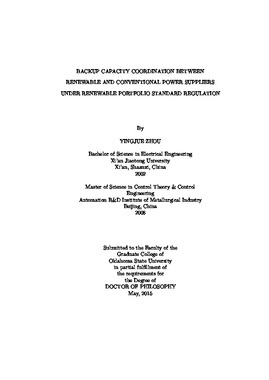| dc.contributor.advisor | Liu, Tieming | |
| dc.contributor.author | Zhou, Yingjue | |
| dc.date.accessioned | 2016-09-29T18:37:41Z | |
| dc.date.available | 2016-09-29T18:37:41Z | |
| dc.date.issued | 2015-05 | |
| dc.identifier.uri | https://hdl.handle.net/11244/45221 | |
| dc.description.abstract | This dissertation studies the impacts of renewable portfolio standard (RPS) regulation on regional electricity markets, and the backup capacity coordination mechanisms between renewable and conventional power suppliers with tradable green certificate (TGC) offering. | |
| dc.description.abstract | Firstly, we consider a regional market with renewable capacity and access to the TGC market. We establish a monopoly model and a duopoly model. We find that the green power output decreases when the RPS percentage increases in a regional market. When the TGC price increases, the green power output increases, and the total profit first decreases then increases. There exists an optimal RPS percentage to maximize the social welfare. By numerical analysis, we show that when the TGC price increases, the electricity outputs change slower in the duopoly market. | |
| dc.description.abstract | Secondly, we study a capacity coordination mechanism in a single region market. The intermittent nature of the renewable supplier results in random power shortage. Though a conventional supplier can prepare backup capacity to cover the shortage, there is no commitment that enough backup capacity will be prepared without any incentives to the conventional supplier. We design a coordination mechanism where the renewable supplier offers the conventional supplier free TGC proportional to the backup capacity. This mechanism coordinates the conventional supplier's decision on backup capacity and arbitrarily splits the system profit between the two suppliers by the wholesale price. | |
| dc.description.abstract | Thirdly, we design a coordination mechanism in a two-regional market with interregional transmission. The renewable suppliers offer TGC and pay transmission premium to encourage the conventional suppliers prepare enough backup capacities. The conventional suppliers decide the interregional transmission prices between them. This mechanism coordinates the system and achieves the global optimum. In contrast, an uncoordinated baseline case leads to under investment of backup capacity and the system profit is less than the global optimum. In the coordination model, when the transmission cost increases, the backup capacity in a region increases if this region is a net importer of backup power, or decreases if it is a net exporter. | |
| dc.format | application/pdf | |
| dc.language | en_US | |
| dc.rights | Copyright is held by the author who has granted the Oklahoma State University Library the non-exclusive right to share this material in its institutional repository. Contact Digital Library Services at lib-dls@okstate.edu or 405-744-9161 for the permission policy on the use, reproduction or distribution of this material. | |
| dc.title | Backup capacity coordination between renewable and conventional power suppliers under renewable portfolio standard regulation | |
| dc.contributor.committeeMember | Balasundaram, Balabhaskar | |
| dc.contributor.committeeMember | Currier, Kevin M. | |
| dc.contributor.committeeMember | Kamath, Manjunath | |
| dc.contributor.committeeMember | Zhao, Chaoyue Charlene | |
| osu.filename | Zhou_okstate_0664D_14092.pdf | |
| osu.accesstype | Open Access | |
| dc.type.genre | Dissertation | |
| dc.type.material | Text | |
| thesis.degree.discipline | Industrial Engineering and Management | |
| thesis.degree.grantor | Oklahoma State University | |
